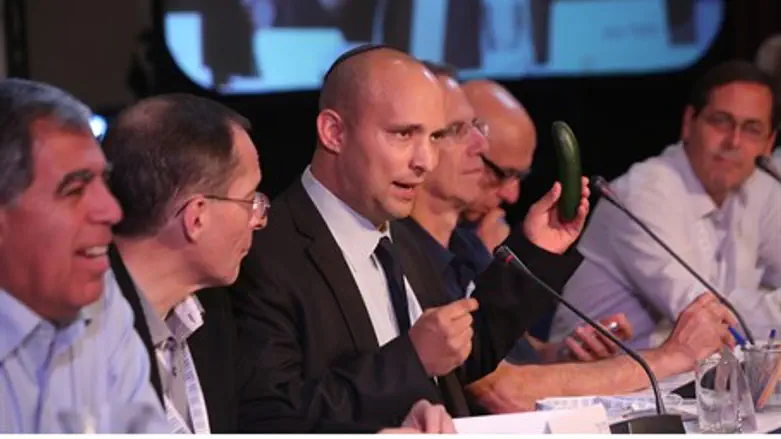
The political issues in Israel are not easy to solve, but there's one thing both right and left can agree on, said Economics Minister Naftali Bennett.
Speaking at an economics conference in Eilat Thursday, Bennett said that “Israel is a light in the economic storm” that the rest of the world is experiencing. “We can agree to disagree about the political issues, but all of realize that Israel is a state of innovation, a state that aims high and accomplishes much.”
As an example of Israel's being “an economic light to the nations,” as Bennett put it, the Economics Minister told of his recent trip to India. “I found myself at a farm that was like a mini-version of the State of Israel, where we are training farmers to work as we do here, and are selling them Israeli equipment. Experts over there told me that thanks to our help, they are now able to grow ten kilos (22 pounds) of cucumbers in a square kilometer of farmland, where before they were able to grow only 2 kilos.
As a "teaching aid," Bennett presented a cucumber to the audience. “That's how we do it in Israel,” Bennett added. “That's why everyone comes here, to see and learn from our economic miracle.”
“The purpose of a lighthouse is to help others with its light, to do good,” Bennett said. “I believe this is the purpose of the Jewish people and the State of Israel. This is something we have done historically, and we do not want to change it. Helping others is genetically implanted in us.”
Finance Minister Yair Lapid, also speaking at the forum, said that the time had come to help the Israeli middle class – and that he was implementing far-reaching changes in the economy to do just that. “When I started this job I was shocked to find out that Israel did not have an economic strategy,”
After months on the job, Lapid said that he seen enough to be able to lay out what that strategy needed to be. “We want Israelis to earn more and have a better quality of life.” The policies he has already implemented, and planned to implement in the future, were geared to doing that, he said.
Referring to Bennett's comments, Lapid said that from a macro-economic point of view, “innovation is not an objective, but a tool. Innovation is a way to ensure that the middle class earns more and that inflation does not erase its gains. We will reach this point when the tax code ensures that the middle class enjoys the fruits of the economy's gains.”
That time had not yet come, Lapid added. “In the past ten years the Israeli economy has grown 26.8%, while the average salary rose just 2.1%. In other words, the workers whose labors grew the economy by 26% personally benefited from that gain by just 2%. They are the ones who turned the economy into a success, but they have not benefitted from that success.” Such a situation was very demotivating, he said, and was not a sustainable long-term model for economic growth, as it contained a built-in disincentive for success.
“The time has come to admit that the idea whereby we have to let the rich earn without limits so that wealth will reach the poor just doesn't work,” Lapid said.